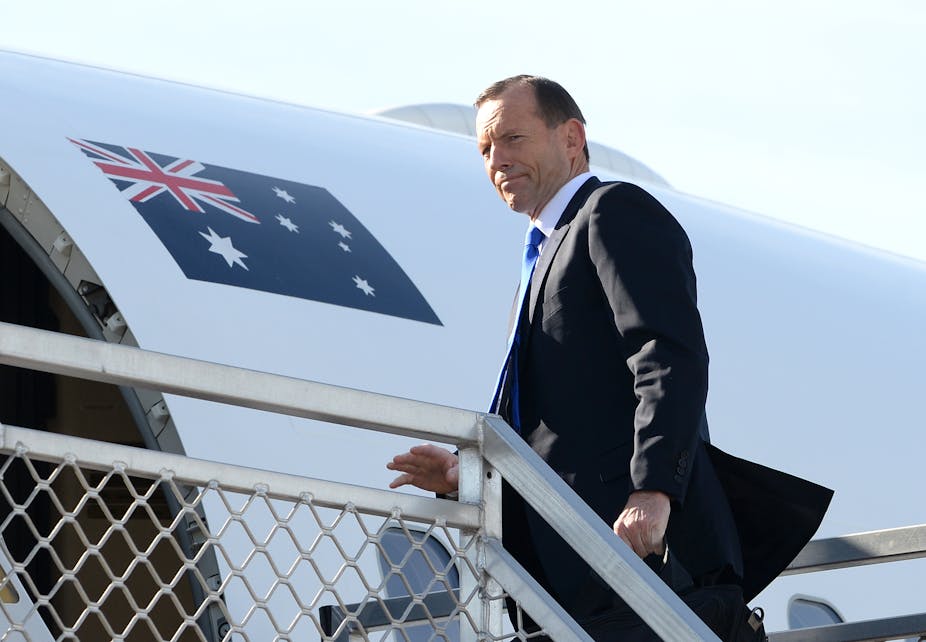Tony Abbott’s initial forays into foreign relations are exceeding expectations. True, the bar was set pretty low for many critics, but the new team is clearly intent on sending positive signals about the importance of Asia in particular. The big test will be what happens when economic and strategic priorities inevitably collide and difficult choices have to be made.
Fortunately for the Abbott government, at least some aspects of the Australia-China relationship are prospering. Somewhat paradoxically, self-confessed foreign affairs neophyte Julia Gillard actually left Sino-Australian ties in better shape than her famously Mandarin-speaking, China-savvy leadership rival, Kevin Rudd. But Gillard’s gushing enthusiasm for the alliance with the United States also reminds us of the absent elephant in the room at the East Asia Summit.
If 80% of life is simply about turning up, then Chinese president Xi Jinping is on a roll. The good news for Abbott is that he can consolidate his personal relationship with China’s paramount leader. The bad news is that no matter how well his bilateral discussions with the Chinese go, they will inevitably draw unfavourable comparisons with the US position. As metaphors for American decline go, the polarised dysfunction that passes for America’s domestic politics is pretty hard to beat.
By comparison China looks pretty good. Sure, some of its cities are horribly polluted, its politics are authoritarian, and its economy is characterised by levels of inequality and corruption that must be making Mao turn in his grave, but this doesn’t make it any the less important for its trade partners. On the contrary, the sheer economic weight of the Chinese economy is transforming the way the world thinks about the Middle Kingdom with potentially profound consequences for prospective friend and foe alike.
For those of us fortunate enough to make a living studying international politics, these are, as they say, “interesting times”. The big question that looms over current events is whether economic interdependence will not only transform relations between nations, but will actually make war unthinkable.
There is no doubt that Australia’s relationship with China has been transformed by the implacable logic of international commerce. For the Abbott government, the challenge is how to take advantage of the economic opportunities China’s rise presents, without compromising the traditional ties that characterise the conservative side of politics.
We can get a clue about what future coalition policy might look like by considering what the Howard government did when it was in power. Significantly, Abbott’s political manifesto Battlelines approvingly quotes his former mentor as saying:
We can never have the sort of intimate relationship with China that we have with the United States because of the very different nature of the Chinese political system.
It was for this reason that Howard favoured a form of “practical realism” when it came to dealing with states with which Australia was thought to have little in common.
Even if we put to one side the fact that the make-up of Australian society is rapidly making these assumptions rather anachronistic, there is the larger question of what China’s leaders will make of such a “practical” approach. To judge from the Howard years, the Chinese may be willing to take an equally pragmatic approach as long as everyone is making money. Economic interdependence is, after all, a two-way street.

Yet many wonder whether this economic pragmatism can be reconciled with the strategic preferences that have been favoured by both sides of politics. The Chinese have been vocal critics of Australia’s high profile, largely symbolic role in America’s “pivot” to East Asia. Sceptics might question what purpose – other than irritating the Chinese – such gestures serve given Australia’s limited ability to influence larger geopolitical contests in the region.
Indeed, if Abbott really believes that China’s growing strength is a benefit not a challenge, as he claims, do we really need to increase defence spending as dramatically as some are demanding?
Containing China is not an option. If Abbott’s words are taken at face value, he presumably would not want to try. And yet foreign minister Julie Bishop’s claim that America’s “rebalance” to the region is unaffected by US president Barack Obama’s absence from APEC suggests a continuing enthusiasm for an enlarged American strategic engagement with the region on the part of the Coalition. Australia’s prominent role in the US pivot means that alliance obligations arguably continue to trump national interests and perspectives.
No doubt it will strike some as strategically illiterate to even question the continuing relevance of the alliance with the US, but it is worth asking who we are actually allying against and why. Given the enormous amounts of the taxpayer’s money that are about to be invested in acquiring new military hardware it would be interesting to know what purpose they are actually expected to serve.
Such a debate might not only have a salutary demonstration affect on China, but it might help the Abbott government to reconcile and articulate its evolving economic and strategic priorities.

